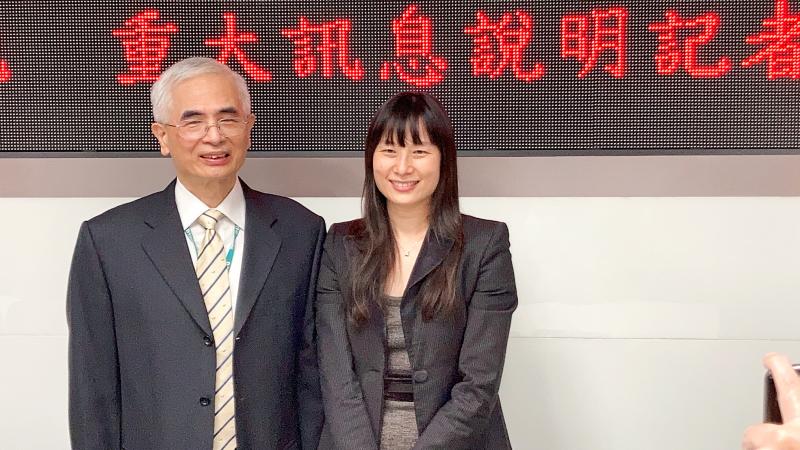Networking equipment maker D-Link Corp (友訊科技) on Tuesday said it plans to participate in a private placement of common shares in Cameo Communications Inc (友勁科技), aiming to bolster its partnership with the networking and communication products supplier.
D-Link plans to invest NT$800 million (US$28.19 million) to acquire 97.68 million Cameo Communications shares at NT$8.19 per share, D-Link chairman John Lee (李中旺) told a news conference at the Taiwan Stock Exchange after the firm’s board of directors approved the proposal earlier on Tuesday.
After the private placement, D-Link’s stake in Cameo Communications would increase to 39.10 percent from 17.35 percent, the company said.

Photo: Wang Yi-hung, Taipei Times
D-Link would retain one seat on Cameo Communications’ board, it said.
Taipei-based D-Link makes network switches, surveillance network cameras, firewalls, routers and smart home accessories, while Cameo Communications’ products include Ethernet cards, hubs, smart switches and routers.
The move would allow D-Link to expand its presence in the US market, Lee said.
“We continue to view the smart switch market favorably,” he said. “More importantly, Cameo Communications’ Tainan production facilities will become a strategic manufacturing base for US-bound exports,” Lee said. “There is a lot of potential for growth in the network switch market, especially smart switches.”
Smart switches, also called Web-managed switches, offer switch management features through a Web browser.
Cameo Communication manufactures half of its products in Tainan and the other half in Suchow, China.
However, production would shift toward Tainan after the firm in July 2019 gained Ministry of Economic Affairs approval to invest NT$550 million in its Tainan operations.
Lee said that the collaboration between the firms would start to bear fruit in six months to a year.
Capital Investment Management Corp (群益投顧) analyst Liu Yi-ho (劉宜和) yesterday said in a note that Cameo Communications is already one of D-Link’s main suppliers, but D-Link has placed some orders for low-priced products with Chinese manufacturers in the past few years.
However, business opportunities for non-Chinese networking and communications products have emerged in the US since the beginning of the US-China trade dispute, while another major supplier to D-Link, Alpha Networks Inc (明泰科技), was acquired by electronics conglomerate Qisda Corp (佳世達) last year, Liu said.
“We believe this private placement will further increase the partnership between D-Link and Cameo, as well as deepen their cooperation in products such as enterprise network switches and enterprise wireless routers,” he said.

South Korea’s equity benchmark yesterday crossed a new milestone just a month after surpassing the once-unthinkable 5,000 mark as surging global memory demand powers the country’s biggest chipmakers. The KOSPI advanced as much as 2.6 percent to a record 6,123, with Samsung Electronics Co and SK Hynix Inc each gaining more than 2 percent. With the benchmark now up 45 percent this year, South Korea’s stock market capitalization has also moved past France’s, following last month’s overtaking of Germany’s. Long overlooked by foreign funds, despite being undervalued, South Korean stocks have now emerged as clear winners in the global market. The so-called “artificial intelligence

Chinese artificial intelligence (AI) start-up DeepSeek’s (深度求索) latest AI model, set to be released as soon as next week, was trained on Nvidia Corp’s most advanced AI chip, the Blackwell, a senior official of US President Donald Trump’s administration said on Monday, in what could represent a violation of US export controls. The US believes DeepSeek will remove the technical indicators that might reveal its use of American AI chips, the official said, adding that the Blackwells are likely clustered at its data center in Inner Mongolia, an autonomous region of China. The person declined to say how the US government received

‘SEISMIC SHIFT’: The researcher forecast there would be about 1.1 billion mobile shipments this year, down from 1.26 billion the prior year and erasing years of gains The global smartphone market is expected to contract 12.9 percent this year due to the unprecedented memorychip shortage, marking “a crisis like no other,” researcher International Data Corp (IDC) said. The new forecast, a dramatic revision down from earlier estimates, gives the latest accounting of the ongoing memory crunch that is affecting every corner of the electronics industry. The demand for advanced memory to power artificial intelligence (AI) tasks has drained global supply until well into next year and jeopardizes the business model of many smartphone makers. IDC forecast about 1.1 billion mobile shipments this year, down from 1.26 billion the prior

FORTUNES REVERSED: The new 15 percent levies left countries with a 10 percent tariff worse off and stripped away the advantage of those with a 15 percent rate In a swift reversal of fortunes, countries that had been hardest hit by US President Donald Trump’s tariffs have emerged as the biggest winners from the US Supreme Court’s decision to strike down his emergency levies. China, India and Brazil are among those now seeing lower tariff rates for shipments to the US after the court ruled Trump’s use of the International Emergency Economic Powers Act to impose duties was illegal. While Trump subsequently announced plans for a 15 percent global rate, Bloomberg Economics said that would mean an average effective tariff rate of about 12 percent — the lowest since